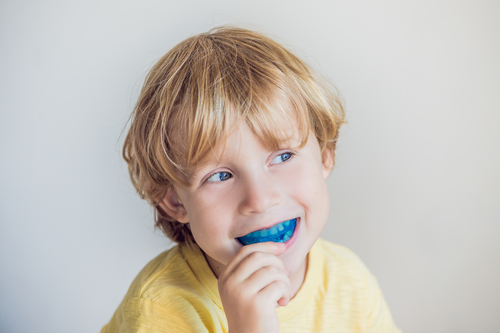Signs It’s Time To Replace Your Dentures
Dentures can be life-changing for those who have lost some or all of their natural teeth. A good quality denture can restore your ability to eat, speak, and smile with...

If your high school athlete is about to begin a spring sport, you may be wondering if a mouthguard should be on the list of required equipment, or perhaps you’re even wondering why it’s not. While not all activities express the need for them, if your child is engaged in a sport, they are susceptible to getting hit in the face.
So which sports require the most protection? Depending on whether you wear a facemask or not, you may need more protection than you think.
The American Dental Association (ADA) and the International Academy of Sports Dentistry (IASD) recommend mouthguards for the following sports:
Contact sports like football and hockey feature helmets and facemasks, while non-contact sports such as soccer and basketball don’t necessarily require players to wear any facial protection. If you consider it logically, it makes sense that combat sports that require repeated, constant and intentional hits to the face require mouthguards.
That being said, the reason you need a mouthguard isn’t about the amount of contact, but the fact that there is contact at all, deliberate or not. The sports that should require mouthguards are the ones that leave your athlete without facial protection – like facemasks, face shields or cages – of any kind.
Every year there are 600,00 emergency room visits each year due to sports-related dental injuries, yet only a handful of sports mandate mouthguards for their athletes. Basketball has the highest number of dental injuries in all high school sports, completely outnumbering football. An athlete is 60 times more likely to incur a dental injury if they are not wearing a mouthguard. In fact, it is estimated that mouthguards prevent more than 200,000 dental injuries every year.
Dental injuries can be grouped into three different categories with care specific to each type:
Fracture. An injury can be classified as a root fracture, broken tooth or chipped tooth. If this type of injury occurs, the athlete and tooth fragments should be transported immediately to a dentist.
Avulsion. If the entire tooth, including the root, is knocked out it. If possible, place the tooth back in the socket and have the athlete gently bite down on a towel. If you are unable to reimplant the tooth, transport the athlete and the tooth to a dentist immediately.
Luxation. When a tooth is still in the tooth socket but is in the wrong position. If the tooth is extruded or appears longer than the surrounding teeth, or if the tooth is pushed back or pulled forward in a lateral displacement, these injuries are also considered luxation.
Dental injuries are one of the easiest injuries to prevent. It has been suggested that a properly fitted custom mouthguard may reduce the rate of concussion as well as dental injuries. The American Dental Association, and Dr. Aubrey Baudean DDS, both recommend wearing custom mouthguards for all sports, whether they’re contact sports or not.
Selecting the perfect mouthguard
The three types of mouthguards include:
The most effective mouthguard should be comfortable, resistant to tearing, and resilient. To ensure the teeth are adequately protected, we always recommend investing in a custom-made mouthguard for your athlete. After all, damaged teeth do not grow back. Protect your athlete’s perfect smile by scheduling an appointment for a custom-made mouthguard with Dr. Baudean today.